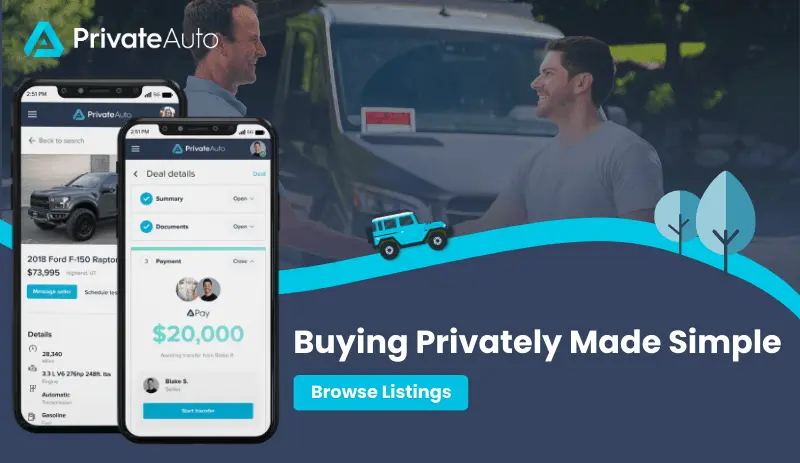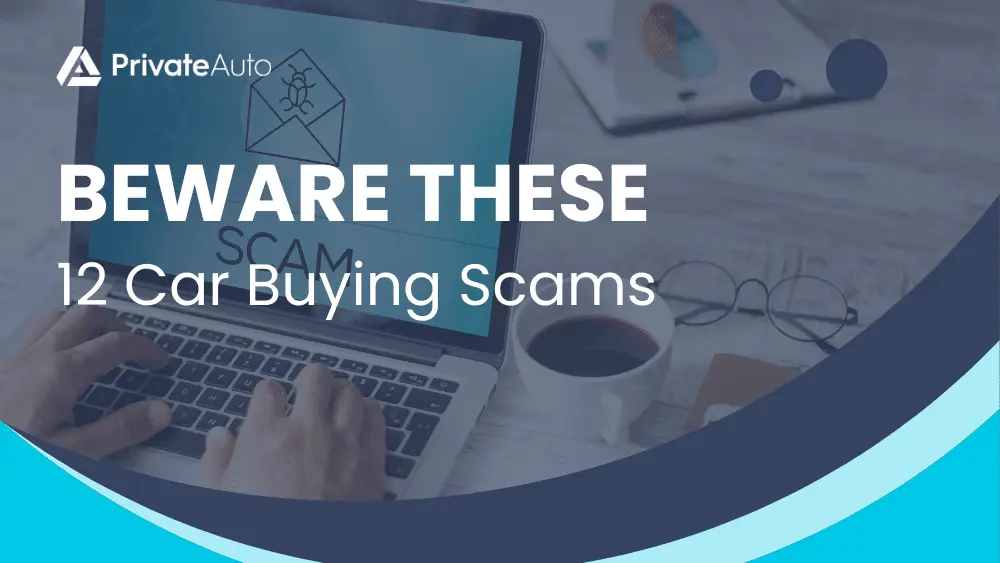We’ve built a self-service platform that gives you the power to get the deal done, from first contact with the seller through paying for the car. To experience the awesomeness, shop private-party used cars for sale and prepare to be amazed.
1. Must sell now scam
One: Must Sell Now Scam
When you reach out to them, the scammers demand upfront payment to reserve the car. Once you fall for it and they receive money, they take the money and disappear.

2. Third-party scam
Two: Third-Party Scam
Scammers will create a convincing fake email address, a website, and even a phone number to appear real. The goal is to convince you to send payment by making you feel secure about the supposed third-party protection.
3. Gift card scam
Three: Gift Card Scam
Once you share the gift card codes, your money is gone. Often, gift card scams involve a lemon or some sort of bait-and-switch scheme.
Legit sellers will accept legitimate payment options, not insist on gift cards. The best way to pay for a car, by far, is PrivateAuto Pay.
4. Wire transfer scam
Four: Wire Transfer Scam
Wired money can’t be canceled or reversed if the car turns out to be misrepresented. Legitimate sellers will not require upfront wire transfers from strangers.
5. Purchase protection scam
Five: Purchase Protection Scam
6. Escrow scam
Six: Escrow Scam
A fraudulent seller convinces a buyer to send money to a fake (usually nonexistent) escrow service. Scammers create convincing websites with logos and branding copied from real escrow companies.
The fraudsters then reach out to potential buyers and claim they will handle the transaction through their escrow service. Unaware that it is a sham site, the trusting buyer follows the “escrow” instructions and submits their payment to the fake company. But in reality, they have just paid the scammer directly, and the money is stolen.
If you’re going to use an escrow service, make sure it’s legitimate. Better yet, skip the expense and hassle of escrow with the self-serve protections of PrivateAuto Pay.
PrivateAuto Pay provides escrow-like safeguards for private-party used vehicle transactions. It’s instant, it’s highly secure, it works 24/7/365, and it has no transaction fees.
7. Curbstoning
Seven: Curbstoning Scam
These sellers disguise defects through cosmetic touch-ups. Once you purchase one of these lemons, the curbstoner often disappears with your money.
Red flags of curbstoning include sellers advertising multiple cars but using the same contact info, refusing official paperwork, and demanding cash payments. Curbstoned vehicles are often parked in high-visibility areas with “For Sale” signs.
PrivateAuto connects buyers with verified sellers. This discourages fraudsters, who prefer to hide in the shadows.
8. Title washing
Eight: Title Washing Scam
But digital records still show the real story. Run a VIN check before buying to uncover title laundering and identify if the car has a salvage title.
9. Odometer fraud
Nine: Odometer Fraud Scam
When buying a used car, thoroughly inspect service records for mileage inconsistencies. Review the title history and Carfax report to check for mileage red flags. Physically inspect the vehicle: excessive wear for low miles can signal rolled-back odometers.
Always verify the odometer reading against paperwork and vehicle condition. If you suspect it has been tampered with, a dealership can check the true mileage via the vehicle’s control module.
10. “Just needs” scam
Ten: “Just Needs” Scam
This tactic hides major defects under the guise of quick fixes. You have to thoroughly inspect and test these cars rather than just making the stated repair. Or avoid “just needs” cars altogether, as critical flaws are often being concealed.
11. Car cloning
Eleven: Car Cloning Scam
The scammers take VINs from a similar make and model and make counterfeit titles, registrations, etc. This makes the car look like it has a clean history when it’s really a cloned car.
Here are things you need to watch for:
- The VIN doesn’t match the vehicle branding or description
- Gaps or inconsistencies in the car’s ownership history
- Titles from many different states for the same VIN
Run the VIN through services like NMVTIS to uncover fraud before buying. They can spot cloned cars by cross-checking the VIN against title and inventory databases.
12. Deposit scam
Twelve: Deposit Scam
Once you submit the deposit, the scammer ceases all contact and disappears with the money without ever providing the vehicle.
This preys on buyers’ fear of missing out on a deal. But legitimate sellers won’t demand deposits before a buyer even inspects the car.
Avoid this scam by never paying anything until you’ve met the seller in person, seen the car yourself, and vetted the situation. Don’t send deposits to strangers just to “secure” a car.
How Do I Avoid Getting Scammed?
PrivateAuto offers vehicle history reports with all premium listings and also has identity verification. These measures cut down significantly on fraudsters, but it always pays to be vigilant.
Don’t let a seller rush you into accepting a high price or paying without verifying the details and test driving. If a seller gives you a high-pressure “act now or lose out” ultimatum, it’s best to walk away. If the car is priced fairly, there will be other listings available without undue seller pressure.
The key is taking your time—carefully inspecting the car, verifying the VIN, test driving carefully, and not paying until you’re confident about going through with the transaction.
PrivateAuto helps by letting you schedule test drives securely and make payments only when terms are met. With a little patience, you can find the right car without being rushed into a fraudulent deal.

How to Buy a Car With PrivateAuto
1. Browse used cars for sale by owner. Filter by location, vehicle type, or other criteria.
2. Make offers on vehicles you like (PrivateAuto lets you offer less than the asking price).
3. Message the seller with any questions without giving your contact info.
4. Schedule the test drive while keeping your personal details private.
5. Electronically sign the bill of sale along with the seller.
6. Instantly send payment and take ownership of the car when the seller signs the title and gives you the keys.
Looking to sell your car? Create a listing on PrivateAuto and connect with interested buyers today!
Car Buying Scams FAQ
What do I do if I get scammed?
If scammed, here are important steps you can take to try limiting the damage and preventing it from happening again:
– Immediately stop all contact with the scammer and stop any in-progress transactions with them. Don’t provide any additional money or information.
– Report the scam to websites or services you used to initiate contact. They may be able to take down fraudulent accounts or listings.
– File a complaint with the Federal Trade Commission (FTC) and your state attorney general’s office. Provide details about the scam and any information you have on the perpetrator.
– Report fraudulent activities to the Consumer Financial Protection Bureau if they involve fake escrow services, cashier’s checks, etc.
– Contact your bank and credit card companies, if applicable. Inform them of the fraud, stop payments if possible, and dispute any unauthorized charges.
– Request a fraud alert on your credit reports by contacting one of the three credit bureaus. This warns lenders to investigate any applications.
– Research recovery options via law enforcement, government agencies, or legal action depending on the scale of the fraud and details of the case.
– Learn from the experience. Familiarize yourself with common sale and purchase scams to avoid being victimized again. Legitimate sites like PrivateAuto offer protection.
What is the safest site for private car sales?
PrivateAuto is the best site for buying a car privately. We are the world’s only transactional automotive marketplace, powered by self-serve technology to help you get the deal done.
For more information, take a look at how PrivateAuto stacks up against competitors.
What do I do if the car turns out to be faulty?
The most common issue that arises from private car sales is that the vehicle is faulty in some way. Other problems can include the seller misrepresenting the make, price, quality, or performance of the car.
It is important to remember that private sellers are not bound by the same laws as dealerships when it comes to selling cars. This means that they do not have to comply with the Consumer Guarantees Act (CGA) or the Fair Trading Act (FTA). However, this does not mean that you cannot attempt to contact the seller to resolve the issue.
If you were persuaded to buy a car based on misleading statements from the seller, you may be able to get a refund or compensation under the Contract and Commercial Law Act (CCLA). If you find yourself in this situation, it is advisable to seek legal counsel to discuss your options. A lawyer can provide you with legal information and help you understand your rights.
Is it illegal to sell a car without disclosing problems?
Private-party car sales are assumed to be “as is,” meaning that the buyer has little recourse after the purchase.
That said, if you can prove that the seller intentionally hid serious issues from you, you may be able to pursue legal action. Check with your state’s attorney general’s office—or consult your own attorney—to see what your options are.

Dana Marchlowitz
Contributing Author
Dana is a seasoned executive with a strong background in startups and product management. Currently serving as the Chief Product Officer for PrivateAuto, Dana brings a wealth of knowledge and expertise to the role….
